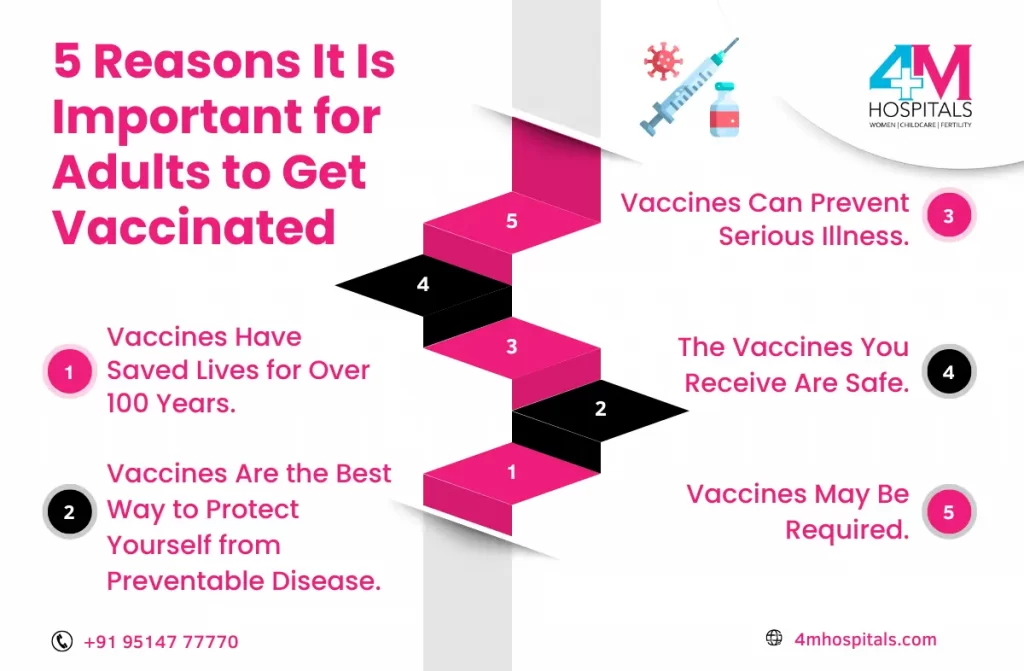Vaccinations are a cornerstone of public health, and this holds true for India as well. A well-structured vaccination chart for babies in India is critical to safeguarding the health and future of the nation. In this comprehensive blog, we delve into the significance of vaccinations for infants in India, emphasizing the importance of adherence to vaccination schedules and the myriad benefits they bring to children, families, and society at large.
The Importance of Vaccination for Babies in India
Vaccinations are essential to protect infants from potentially life-threatening diseases. In India, where the burden of infectious diseases is relatively high, timely vaccination plays a crucial role in reducing child mortality rates and preventing the spread of contagious illnesses.

The Vaccination Chart for Babies in India
India follows a well-defined vaccination schedule recommended by the Ministry of Health and Family Welfare. The vaccination chart for babies in India is designed to immunize infants against various diseases, starting from the time of birth and continuing through childhood. Key vaccines administered include those for tuberculosis, polio, diphtheria, pertussis, tetanus, hepatitis B, measles, and rubella, among others.
Vaccination Chart for Babies in India
| (Months/Years) | Vaccines Given | Additional Details |
| Birth | BCG, Hepatitis B1, OPV | – BCG: Bacillus Calmette-Guérin vaccine for TB protection – Hepatitis B1: Hepatitis B vaccine dose 1- OPV: Oral Polio Vaccine dose 1 |
| 6 weeks | DTwP/DTaP1, Hep B2, PCV 1, Hib-1, IPV-1, Rota-1 | – DTwP/DTaP1: Diphtheria, Tetanus, and Pertussis vaccine dose 1- Hib-1: Haemophilus Influenzae type b vaccine dose 1- IPV-1: Inactivated Polio Vaccine dose 1- Hep B2: Hepatitis B vaccine dose 2- PCV 1: Pneumococcal Conjugate Vaccine dose 1- Rota-1: Rotavirus vaccine dose 1 |
| 10 weeks | DTwP/DTaP2, Hep B3, PCV 2, Hib-2, IPV-2,Rota-2 | – DTwP/DTaP2: Diphtheria, Tetanus, and Pertussis vaccine dose 2- Hib-2: Haemophilus Influenzae type b vaccine dose 2- IPV-2: Inactivated Polio Vaccine dose 2- Hep B3: Hepatitis B vaccine dose 3- PCV 2: Pneumococcal Conjugate Vaccine dose 2- Rota-2: Rotavirus vaccine dose 2 |
| 14 weeks | DTwP/DTaP3, Hep B4, PCV 3, Hib-3, IPV-3, Rota-3 | – DTwP/DTaP3: Diphtheria, Tetanus, and Pertussis vaccine dose 3- Hib-3: Haemophilus Influenzae type b vaccine dose 3- IPV-3: Inactivated Polio Vaccine dose 3- Hep B4: Hepatitis B vaccine dose 4- PCV 3: Pneumococcal Conjugate Vaccine dose 3- Rota-3: Rotavirus vaccine dose 3 |
| 6 Months | Influenza-1 | – Influenza-1: Annual Influenza vaccine dose 1 |
| 7 Months | Influenza-2 | – Influenza-2: Annual Influenza vaccine dose 2 |
| 6-9 Months | Typhoid Conjugate Vaccine | – Protection against Typhoid |
| 9 Months | MMR 1 (Mumps, Measles, Rubella) | – MMR 1: Measles, Mumps, Rubella vaccine dose 1 |
| 12 Months | Hepatitis A-1 | – Hepatitis A-1: Hepatitis A vaccine dose 1 |
| 12-15 Months | PCV Booster | – PCV Booster: Pneumococcal Conjugate Vaccine booster |
| 15 Months | MMR 2, Varicella | – MMR 2: Measles, Mumps, Rubella vaccine dose 2 |
| 16-18 Months | DTwP/DTaP, IPV, Hib | – DTwP/DTaP: Diphtheria, Tetanus, and Pertussis booster- IPV: Inactivated Polio Vaccine booster |
| 18-19 Months | Hepatitis A-2**, Varicella 2 | – Hepatitis A-2: Hepatitis A vaccine dose 2 |
| Years 2, 3, 4 | Annual Influenza Vaccine | – Yearly protection against Influenza |
| 4-6 years | DTwP/DTaP, MMR 3, IPV | – DTwP/DTaP: Diphtheria, Tetanus, and Pertussis booster- MMR 3: Measles, Mumps, Rubella vaccine dose 3 |
| 9-15 years (Girls) | HPV (2 doses) | – HPV: Human Papillomavirus vaccine for girls (2 doses) |
| 10-12 Years | Tdap/Td | – Tdap/ |
Benefits of Vaccination for Babies in India
- Prevention of Deadly Diseases: Vaccinations protect babies from potentially fatal diseases, including measles, polio, tetanus, and hepatitis B. This early protection sets a strong foundation for a healthy life.
- Herd Immunity: Widespread vaccination creates herd immunity, reducing the overall prevalence of diseases in the community. This benefits not only vaccinated individuals but also those who cannot receive vaccines, such as infants with certain medical conditions.
- Eradication of Diseases: India has made significant progress in eradicating diseases like polio through vaccination campaigns. Continued efforts with reference to vaccination chart for babies in India can lead to the complete elimination of certain diseases.
- Reduced Health Burden: By preventing diseases, vaccines reduce the burden on healthcare systems, ensuring that resources can be allocated to other critical health needs.
- Economic Benefits: Vaccination contributes to economic development by reducing healthcare costs for families and preventing work days lost to illness, ultimately benefiting the nation’s economy.
- Improved Quality of Life: Vaccinated children are less likely to suffer from disabilities caused by vaccine-preventable diseases, leading to a better quality of life.
Addressing Concerns and Ensuring Vaccine Safety
Vaccination chart for babies in India, While vaccines are generally safe, concerns about side effects occasionally arise. It’s important to emphasize that the benefits of vaccination far outweigh the risks. The government and healthcare providers continually monitor vaccine safety, and any adverse events are thoroughly investigated. Parents should consult healthcare professionals to address any concerns and ensure their children receive recommended vaccinations.
Do’s & Don’t of Baby’s Vaccination
Do’s During and After Your Baby’s Vaccination:
- Follow the Recommended Vaccination Schedule: Ensure that your baby receives vaccines according to the vaccination chart for babies in India recommended by your healthcare provider. Timely vaccinations are essential for optimal protection.
- Comfort and Soothe: Hold and comfort your baby during and after the vaccination to provide reassurance and minimize distress.
- Stay Informed: Ask your healthcare provider any questions or concerns you may have about the vaccines or any information about all vaccine chart for child in India. Being informed can alleviate anxiety.
- Keep Records: Maintain a detailed record of your baby’s vaccinations, including dates and types of vaccines administered. This will help you stay on track with the schedule.
- Observe for Reactions: After vaccination, monitor your baby for any potential reactions, such as fever, swelling, or tenderness at the injection site. These are generally mild and temporary.
- Give Pain Relievers as Advised: If your healthcare provider recommends pain relievers like acetaminophen (paracetamol), administer them as directed to ease discomfort. However, avoid giving medication without professional advice.
Don’ts During and After Your Baby’s Vaccination:
- Don’t Panic: It’s normal for babies to cry or experience mild discomfort after vaccinations. While it may be distressing, these reactions are usually temporary.
- Don’t Skip Vaccinations: Missing or delaying vaccines can leave your baby susceptible to preventable diseases. Stick to the recommended schedule.
- Avoid Overuse of Pain Relievers: Refer to the vaccination chart for babies in India and use pain relievers only as advised by your healthcare provider. Overuse can be harmful.
- Don’t Worry About Autism: Vaccines do not cause autism. Numerous scientific studies have debunked this myth.
- Avoid Stressing Your Baby: Try to keep your baby relaxed and comforted during the vaccination process. Your calm demeanor can alleviate their anxiety.
- Don’t Hesitate to Seek Help: If you notice any severe or unusual reactions after vaccination, such as high fever, breathing difficulties, or a severe allergic reaction, seek immediate medical attention.
Remember that vaccinations mentioned in all vaccine chart for child in India are a crucial part of protecting your baby’s health and preventing serious diseases. While some discomfort or mild reactions may occur, the benefits of vaccination in safeguarding your child’s long-term well-being far outweigh any temporary discomfort. Always consult your healthcare provider if you have concerns about vaccinations or their potential side effects.
General Precautions Before Vaccination
Vaccination is a crucial aspect of child healthcare, offering protection against various infectious diseases. Before administering vaccines, it’s essential to follow general precautions to ensure a safe and effective immunization process.
- Health Assessment: Ensure the child is in good health and inform healthcare providers about any existing illnesses or allergies.
- Previous Reactions: Discuss any previous adverse reactions to vaccines with the healthcare provider.
- Fever Check: Check for fever, and if the child has a moderate to severe illness, vaccination may be postponed.
- Allergies: Inform healthcare providers about any known allergies, especially to vaccine components.
- Record Maintenance: Maintain a vaccination chart for babies in India, documenting each administered vaccine, including dates and types. This helps track the immunization schedule effectively.
By adhering to these precautions, parents can contribute to the successful and safe administration of vaccines, ensuring optimal protection for their child’s health.
Conclusion
To conclude, the vaccination chart for babies in India is a powerful tool in protecting children from life-threatening diseases. Adhering to vaccination schedules not only safeguards individual health but also contributes to public health and the overall well-being of the nation. As India continues to make strides in healthcare, vaccinations remain a cornerstone of disease prevention and a promising pathway to a healthier future for its youngest citizens.
Also, Read Best Childrens Hospital in Chennai.





